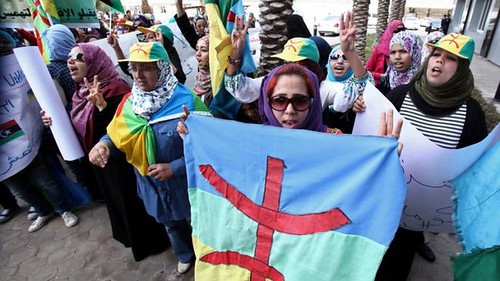
Berbers in Libya demonstrating outside the rebel parliament. Most groups in Occupied Libya are suffering since the overthrow of Gaddafi in 2011., a photo by Pan-African News Wire File Photos on Flickr.
Tagged:
GovernanceHuman RightsLibyaNorth Africa
Magharebia (Washington DC)
Libyan Amazighs Push for Recognition
BY ALI AL-GATTANI, 18 AUGUST 2013
Benghazi — Members of Libya's Amazigh community stormed the General National Congress (GNC) last Tuesday (August 13th) to protest what they say is their marginalisation, AFP reported.
The Amazighs, who make up about 10 per cent of Libya's population, are demanding that their language, ethnicity and culture be recognised in the future constitution.
Amazighs are also taking part in civil disobedience in protest of the GNC's failure to approve the principle of consensus for the constitutional commission, which will be elected soon.
To discuss the issue and minority representation in Libya's new democratic constitution, Magharebia sat down with Ali Munir Abul Soud, one of five members representing Libya's Amazighs in the World Amazigh Congress.
Magharebia: What exactly do you want in the next constitution?
Ali Munir Abul Soud: Our problem for the time being is not with the constitution; the Amazigh members have resigned from the General National Congress (GNC) in protest of its failure to approve the principle of consensus in the constitutional commission law (the 60-member panel). We've suggested consensus between the components of Libyan people in taking a decision about five articles: name of state, its language, identity, flag and its national anthem.
We've not yet reached the stage of constitution. We're now struggling to make consensus the main principle. As to the constitutional text which we're demanding, it can be prepared by legists, and we have examples from several constitutions, such as the Moroccan constitution given the similarities in terms of environment and composition between the two peoples. Based on that, Arabic and the Amazigh language can be two official languages for the Libyan state.
Magharebia: Won't the formalisation of your language and its use in official dealings between state institutions be a burden on them, especially as they suffer from bureaucracy in the first place?
Abul Soud: This is a preliminary view. Right now, we want to ensure that our language will remain as a living language for the state. In our view, the next parliament should establish a mechanism governing its use at government departments in the next five or ten years.
Magharebia: Won't the Amazigh revolutionaries' halting of oil flows and closing the Wazen and Dhiba border crossings impact relations with neighbouring Tunisia?
Abul Soud: What the Amazigh revolutionaries have done is a big mistake that hurts national economy. However, this act has been done by many Libyans not just the Amazighs.
Magharebia: As Amazighs, how do view the suggestion to make Libya a federal state?
Abul Soud: In my opinion, the federal system may be successful in a nascent country and may bring good to Libya. Libya was established in 1951, it formed its institutions and departments based on the federal system, and at its current situation, it is in bad need for a federal government or a decentralised system with broad powers.
Magharebia: Does the World Amazigh Congress intervene in the internal affairs of Libya's Amazighs or does it give you any recommendations?
Abul Soud: The relationship with the World Amazigh Congress is a connection with affiliate Amazigh associations and has nothing to do with Libyan affairs.
Recommendations are not made by it, but by the Supreme Council of Amazighs which includes all local councils of Amazigh cities in Libya.
No comments:
Post a Comment